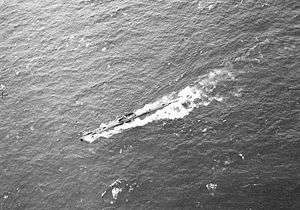Rainbow-class submarine
The Rainbow-class submarine or R class was a quartet of patrol submarines built for the Royal Navy in the early 1930s.
 HMS Regent underway | |
| Class overview | |
|---|---|
| Name: | Rainbow class |
| Operators: |
|
| Preceded by: | Parthian class |
| Succeeded by: | S class |
| In commission: | 1930–1946 |
| Planned: | 6 |
| Completed: | 4 |
| Cancelled: | 2 |
| Lost: | 3 |
| Retired: | 1 |
| General characteristics [1] | |
| Type: | Submarine |
| Displacement: |
|
| Length: | 287 ft (87 m) |
| Beam: | 30 ft (9.1 m) |
| Draught: | 16 ft (4.9 m) |
| Propulsion: |
|
| Speed: |
|
| Complement: | 53 |
| Armament: |
|
Design and description
The Rainbow-class submarines were designed as improved versions of the Parthian class and were intended for long-range operations in the Far East. The submarines had a length of 287 feet 2 inches (87.5 m) overall, a beam of 29 feet 10 inches (9.1 m) and a mean draft of 13 feet 10 inches (4.2 m). They displaced 1,772 long tons (1,800 t) on the surface and 2,030 long tons (2,060 t) submerged. The Rainbow-class submarines had a crew of 56 officers and ratings. They had a diving depth of 300 feet (91.4 m).[2]
For surface running, the boats were powered by two 2,200-brake-horsepower (1,641 kW) diesel engines, each driving one propeller shaft. When submerged each propeller was driven by a 660-horsepower (492 kW) electric motor. They could reach 17.5 knots (32.4 km/h; 20.1 mph) on the surface and 9 knots (17 km/h; 10 mph) underwater. On the surface, the boats had a range of 7,050 nautical miles (13,060 km; 8,110 mi) at 9.2 knots (17.0 km/h; 10.6 mph) and 62 nmi (115 km; 71 mi) at 4 knots (7.4 km/h; 4.6 mph) submerged.[2]
The boats were armed with six 21-inch torpedo tubes in the bow and two more in the stern. They carried six reload torpedoes for a grand total of fourteen torpedoes. They were also armed with a QF 4.7-inch (120 mm) Mark IX deck gun.[3]
Boats
Six boats were planned, but economic considerations resulted in the cancellation of the projected boats HMS Royalist and HMS Rupert.
| Name | Builder | Launched | Fate |
|---|---|---|---|
| Rainbow | Chatham Dockyard | 14 May 1930 | Sunk 4 October 1940 in collision with the Italian merchant ship Antonietta Costa[4] |
| Regent | Vickers, Barrow in Furness | 11 June 1930 | Sunk 18 April 1943 by mines near Barletta, Apulia, Italy |
| Regulus | Vickers, Barrow in Furness | 11 June 1930 | Sunk 6 December 1940 by mines near Taranto, Apulia, Italy |
| Rover | Vickers, Barrow in Furness | 11 June 1930 | Scrapped 1946 |
It is often stated that the Italian submarine Enrico Toti sank HMS Rainbow. However, the submarine Enrico Toti sank was HMS Triad.[4]
Notes
- Conway's All the World's Fighting Ships
- Bagnasco, pp. 106–07
- Chesneau, p. 49
- "HMS Rainbow (N 16)". uboat.net. Retrieved 20 June 2015.
References
- Akermann, Paul (2002). Encyclopaedia of British Submarines 1901–1955 (reprint of the 1989 ed.). Penzance, Cornwall: Periscope Publishing. ISBN 1-904381-05-7.
- Bagnasco, Erminio (1977). Submarines of World War Two. Annapolis, Maryland: Naval Institute Press. ISBN 0-87021-962-6.
- Caruana, Joseph (2012). "Emergency Victualling of Malta During WWII". Warship International. LXIX (4): 357–364. ISSN 0043-0374.
- Colledge, J. J.; Warlow, Ben (2006) [1969]. Ships of the Royal Navy: The Complete Record of all Fighting Ships of the Royal Navy (Rev. ed.). London: Chatham Publishing. ISBN 978-1-86176-281-8.
- Chesneau, Roger, ed. (1980). Conway's All the World's Fighting Ships 1922–1946. Greenwich, UK: Conway Maritime Press. ISBN 0-85177-146-7.
- McCartney, Innes (2006). British Submarines 1939–1945. New Vanguard. 129. Oxford, UK: Osprey. ISBN 1-84603-007-2.
External links
| Wikimedia Commons has media related to Rainbow class submarines. |